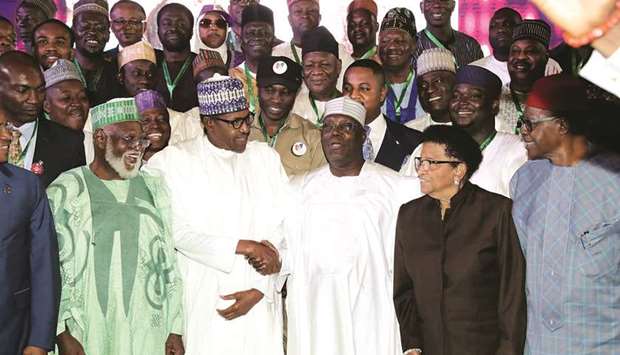Nigeria’s two main presidential hopefuls yesterday appealed for non-violence at this weekend’s elections and vowed to accept the result.
President Muhammadu Buhari and Atiku Abubakar joined other candidates to sign a “peace accord”, in front of foreign observers, including Commonwealth head Patricia Scotland.
The signatories called on their supporters “to refrain from violence or any acts that may in any way jeopardise our collective vision of a free, fair and credible election”.
“We also pledge to respect the outcome of free, fair and credible elections,” they added.
Some 84mn people are registered to vote on Saturday in presidential and parliamentary elections.
Polling for new state governors and state assembly members is on March 2.
Buhari came to power in 2015 as the first opposition candidate to defeat a sitting president.
In another first, his opponent, Goodluck Jonathan, also conceded defeat.
The head of state said this year’s vote was another landmark, with more women and young people, and a record 91 parties and more than 70 presidential candidates.
But he called for greater engagement in politics to help address pressing issues in Africa’s most populous nation.
“Elections by themselves do not constitute democracy,” said Buhari, of the ruling All Progressives Congress (APC) party.
“It is the spirit of citizenship engagement that utilises the energy of citizens towards the attainment of good governance.”
Abubakar, a former vice-president representing the Peoples Democratic Party (PDP), called on the election commission and security agencies to be neutral.
Claims that Buhari and the APC is looking to rig the result has been a feature of the PDP campaign, as has reminding voters of Buhari’s past as a former military ruler.
He said in a speech that “General Buhari” needed to ensure that “every eligible person who casts their vote is confident in the process and in the belief that their vote will count”.
Buhari, who he has accused of “dictatorship”, also needed to “abide by the will of the people as freely expressed through elections, under the terms of our constitution”, he added.
This year’s ceremony was organised by former military ruler Abdulsalami Abubakar and his National Peace Committee, and backed by the Kofi Annan Foundation.
Former US president Bill Clinton was invited but decided not to travel to Abuja because his presence had “the potential to be politicised”, his spokesman, Angel Urena said.
Meanwhile, a judge yesterday ordered Nigeria’s most senior police officer to arrest the country’s chief justice, after he was suspended on charges of breaching asset declaration rules.
The chairman of the Code of Conduct Tribunal, Danladi Umar, issued the demand after judge Walter Onnoghen again failed to appear at the hearing to formally enter a plea.
Onnoghen was charged last month with failing to declare foreign currency bank accounts, in contravention of rules governing declaration of assets for public officials.
Buhari then suspended and replaced him, prompting claims of executive meddling in the judiciary just before elections where Onnoghen could hear any appeals.
Umar insisted last week the judge should appear before him yesterday.
But he was forced to adjourn the case as Onnoghen was again a no-show.
“The Inspector General of Police (Mohammed Adamu) is hereby ordered to arrest and bring the defendant unfailingly on the next sitting of the court on Friday,” he added.
Buhari’s opponents have suspected the suspension of Onnoghen is politically motivated, as his Supreme Court has overturned a number of corruption convictions.
The official complaint about the bank accounts was also made by a former Buhari spokesman.
Under Nigeria’s constitution, only parliament can approve a request to remove the chief justice by a two-thirds majority of the Senate.
Onnoghen and Umar are also facing hearings at the National Judicial Council, the statutory body that oversees the appointment and discipline of judges. It sits next on Tuesday.

Nigerian President and All Progressives Congress (APC) candidate Muhammadu Buhari and Peoples Democratic Party (PDP) presidential candidate Atiku Abubakar shake hands during their meeting at International Conference Center in Abuja to sign the national peace accord for the preparation of the presidential election on Saturday.
